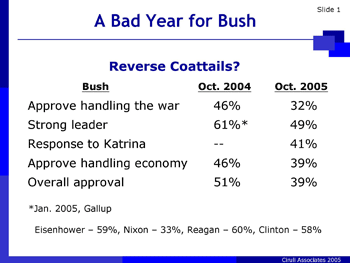|
Colorado Election 2006
Is Colorado shifting to the center of the political
spectrum, producing a more competitive politics?
PowerPoint Presentation
By Floyd Ciruli, Ciruli Associates
November 2005
Floyd Ciruli conducted a series of presentations to civic and political groups in October and November 2005 on the Referenda C and D election and the 2006 political environment. The following PowerPoint describes current national and local political trends and the impact on the 2006 election.
Referenda C and D
Referenda C and D (tax limitation and bonding authority) are preludes to the 2006 governor and congressional elections in Colorado. Colorado Democrats, newly installed in power in the state legislature, staked their credibility on convincing the electorate they can be trusted with a $6 billion spending increase.
Gov. Bill Owens, concerned about the continuing budget shortfalls and believing his party had to join with business and media influentials, accepted a fiscal compromise on tax limitation. His role precipitated a deep fissure in the Republican Party, with about 60 percent of the party remaining supportive of a strict TABOR tax limit, and with both 2006 Republican candidates for governor opposing his position.
Meanwhile, the national political environment has shifted dramatically the last 12 months with President Bush and the Republican control of Washington D.C. on the defensive.
Rough Season for Bush

President Bush’s political support has receded since his close 2004 re-election to his base of conservative and loyal Republicans. A series of setbacks and controversies have reduced his approval rating to a record low for a president as he begins his last three years in office. In particular, the lingering war and the daily media drumbeat of American deaths has depleted public support for the war and undermined Bush’s strength as a leader against terrorism.
- National security and the war on terror were Republican political assets in the 2002 and 2004 elections, but today, a majority of voters (54%) believe the war’s major theater, Iraq, was a mistake. Fifty-two percent want a withdrawal in one year or less. And approval of the President’s performance is at 35%.
- Although the economy continues to grow, concern about energy prices and inflation have hit voter confidence.
- A Bush strength has been his leadership skills established after 9/11, but the slow and unsteady response to Hurricane Katrina undermined it.
- Investigations and indictments (Libby and DeLay) have hurt Republican credibility, distracted the White House and damaged party discipline in the House of Representatives.
- The President’s overall approval at 39% (Oct. 2005) is lower than Eisenhower, Reagan and Clinton at the same time in their second terms. Only Nixon at 33% was lower. By the end of November, it had declined since October to 37% in Gallup polls.
- Further decline is possible as the Harriet Miers Supreme Court nomination and federal deficit sap Bush’s support among conservative constituencies.
next slide >>
[top] [archives] [home] [send this page to a friend]
|